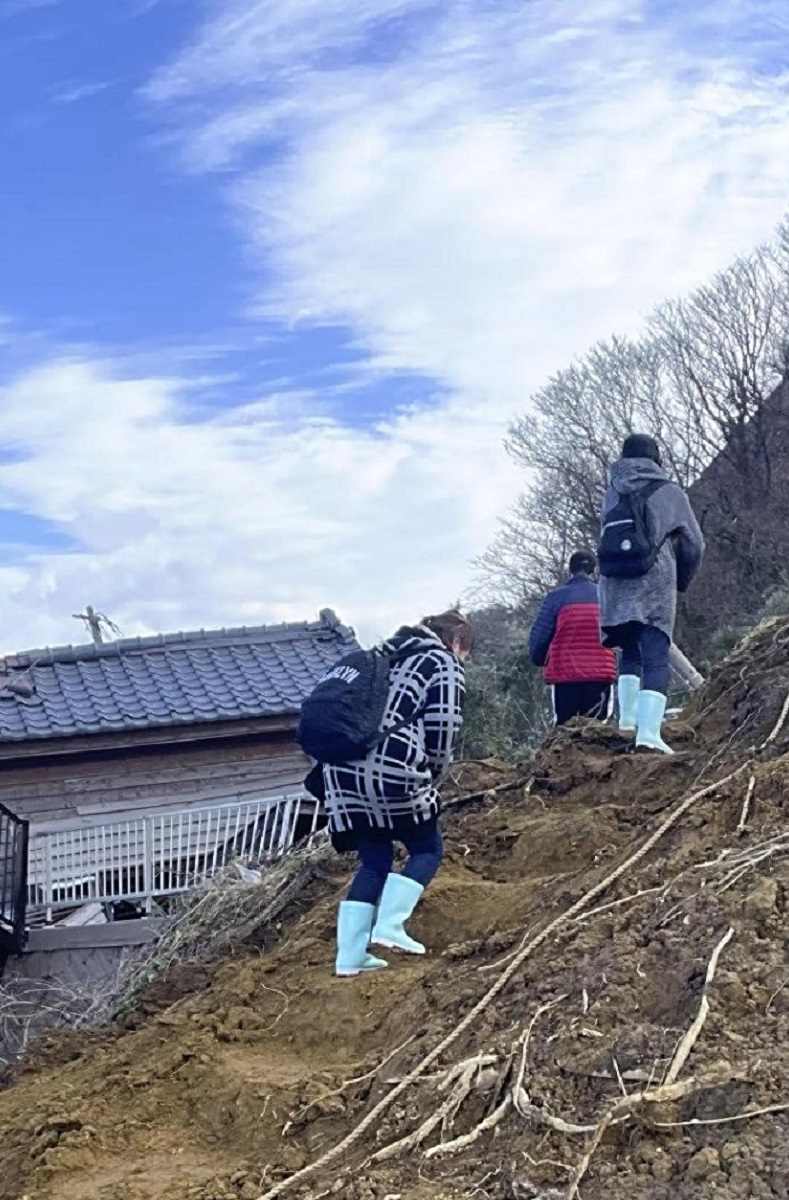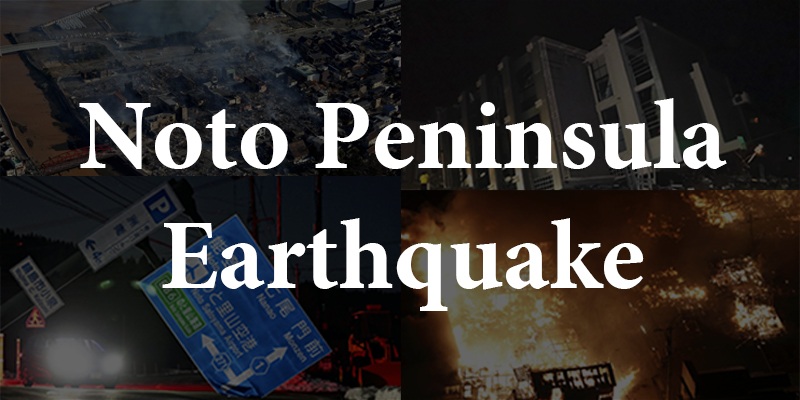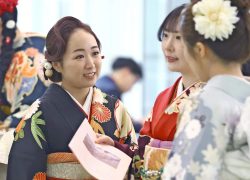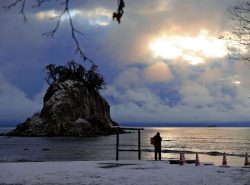Evacuees Survive by Climbing Mudslide to Get Relief, Sleeping in Car, Garage after Quake in Noto Peninsula

Hisayoshi Hama and his wife, Kiyomi, live as evacuees in a garage next to their collapsed home in Suzu, Ishikawa Prefecture.
18:29 JST, January 5, 2024
WAJIMA/SUZU, Ishikawa — Roads that lead to the areas afflicted by Monday’s massive earthquake in the Noto region of Ishikawa Prefecture have been severed, making it difficult for relief supplies to reach evacuees.
Five days have passed since the earthquake that registered the highest level on the Japanese intensity scale struck the Noto Peninsula and surrounding areas. Some people are living in their cars or garages instead of staying in crowded evacuation centers. With life as evacuees feared to continue, residents say they are at their limits.
Climbing over mud

People with supplies climb over the dirt that block the road in Wajima, Ishikawa Prefecture, on Friday.
Residents are seen climbing over piles of dirt several meters high while holding cardboard boxes filled with plastic bottles among other goods.
“The road is impassable, and supplies have not arrived at all,” said a 46-year-old man, who has evacuated to Onomachi district of Wajima, Ishikawa Prefecture. The road connecting to the heart of Wajima has been severed, leaving the district isolated.
A massive landslide triggered by the quake completely blocked the road, forcing people to make their way by climbing up and down the mountain of dirt.
Relief supplies have not arrived at the evacuation center that shelters about 100 people including children and the elderly, and its stockpiles of food and water are nearly depleted. Resident volunteers walk over the dirt, taking 30 minutes to get to a base where relief supplies arrive and bringing them back to distribute at the center.
According to the residents, it will likely take at least a month for the roads to be reopened.
“We are managing to get by, but there is a limit to how much we can transport them on foot amid the fear of another landslide,” the man said. “We want the supplies to be delivered as soon as possible.”
Living in a garage
A large kotatsu, a table with an electric heater underneath and covered by a quilt, was placed in a garage next to a destroyed house in Suzu in the prefecture. Steam was rising from a kettle sitting on top of the stove, and the radio was broadcasting earthquake-related information. The garage’s owner, Hisayoshi Hama, and his wife, Kiyomi, both 69, live here as evacuees.
Hisayoshi, an office worker, was taking a nap in his room on the second floor when he was hit by a violent tremor on Monday. He rushed outside to escape. Hisayoshi, Kiyomi, their eldest son and daughter who both came back for the holidays among other family members were all safe.
They evacuated to a school on Monday, but the floor was cold, and the school was crowded. They returned to their home Tuesday and decided to live in an undamaged steel-framed garage.
They waded through the debris in his collapsed house and took out the kotatsu and the stove to keep themselves warm. Electricity is supplied by his car.
Following a series of major earthquakes that have hit the prefecture in recent years, the couple had stockpiled emergency food in their barn, but it was destroyed by the Monday quake and was no longer usable.
For the first two days, there were no food rations at the shelter, so they made do with grilled rice balls and water distributed by local residents. Since then, a fish ball soup and onigiri rice balls started being provided. Even so, the tough situation continued.
“There are areas where food has not arrived at all,” the man said. “We are one of the fortunate ones.”
In a car
Kenichi Tanaka, 44, from tsunami-hit Suzu, sleeps in his car near an evacuation center. He fled without any stockpiled food and supplies in his hand following a tsunami warning issued immediately after the earthquake.
“I only have enough water and food for one more day or so now,” he said.
A school that serves as an evacuation center is overflown with people.
“I can’t help but be concerned by eyes of others. It would be nice if there was something like partitions,” Tanaka said.
Top Articles in Society
-

Man Infected with Measles Reportedly Dined at Restaurant in Tokyo Station
-

Man Infected with Measles May Have Come in Contact with Many People in Tokyo, Went to Store, Restaurant Around When Symptoms Emerged
-

Woman with Measles Visited Hospital in Tokyo Multiple Times Before Being Diagnosed with Disease
-

Australian Woman Dies After Mishap on Ski Lift in Nagano Prefecture
-

Foreign Snowboarder in Serious Condition After Hanging in Midair from Chairlift in Nagano Prefecture
JN ACCESS RANKING
-

Japan PM Takaichi’s Cabinet Resigns en Masse
-

Japan Institute to Use Domestic Commercial Optical Lattice Clock to Set Japan Standard Time
-

Israeli Ambassador to Japan Speaks about Japan’s Role in the Reconstruction of Gaza
-

Man Infected with Measles Reportedly Dined at Restaurant in Tokyo Station
-

Videos Plagiarized, Reposted with False Subtitles Claiming ‘Ryukyu Belongs to China’; Anti-China False Information Also Posted in Japan

























